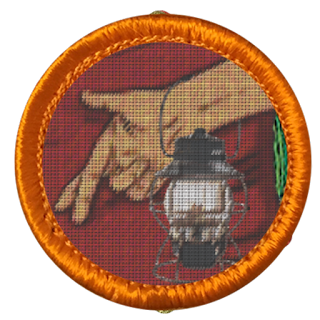Toward a Psychology of Being (Go On: Reading Curriculum)
manbug I VOTED sticker
Addendum to The Silver Fox Story
 |
| rechargeable LED pet collar |
Left out in my yard for squirrels and birds
My weak flashlight-torch combined with my
Ignorance (silver fox are very different from grey fox)
Last night my cat, Cecil, and I watched for
More bats and fireflies in almost-complete darkness
While in my lap, I extinguished his collar
Silent minutes passed until Cecil slowly turned to
Stare below-back-down-behind the lawn-chair we were in
My light revealed a nose-to-tail-black fox (with just a slight dusting of silver-ash)
She dashed under my neighbor's fence without learning if there were any snacks left out
There were not. Not that night.
Silver Grey Fox on Picnic Table
Spiral Dynamics (Go On: Reading Curriculum)
- Skip the doubly-extensive and poorly constructed introductions and absolutely do not begin reading at the front of the book. Instead, begin by a scan of the chart on page 300-301.
- While reading the following portions, let your attention flow past any/all sentences which reference the author's penchant for: endlessly listing examples, obscure cultural references, name-dropping, and the author's incessant need to pat themselves on the back or point out how smart that they think they are. [Think of this as you attempting to speed read.]
- The oddly confusing (and sometimes very wrong) cultural references are deeply rooted in the author's rich, old, white, privilege. These sometimes humorous but never interesting to read pseudo-metaphorical references make this entire book seem like it was written for the audience of a 1996 magazine.
- Scan over the Yellow section (pages 274-285). It is valuable. The authors actually read and/or talked with people who are Yellow. They themselves are not, but they want to be.
- Briefly scan over the Turquoise section (pages 286-292). It is conjecture and hypothetical.
- Read the Orange, Green, Blue, Red, and Purple sections (between pages 201 and 273). It is not necessary to read them in any order. If you are uninterested in some areas, skip it.
- Finish with Chapter 2 (pages 34-38).
- If you find this amount of information sufficient, that is all that is required to continue with the Go On project.
- If you want to read more (because you are a CEO, or a politician who recognizes a way to flow from Blue-Orange and can envision the calm peacefulness of Yellow) reading the rest of the book might help.
Course Curriculum (Go On, Part 1)
PS: When you get tangled in the flow of investigating one, or many, of these essays; pause and listen to some (or many) of the rhythms compiled in the last video. Or just give yourself some space to locate the knots and time to grasp the rest. It really is as simple as meditating listening without falling asleep.















































